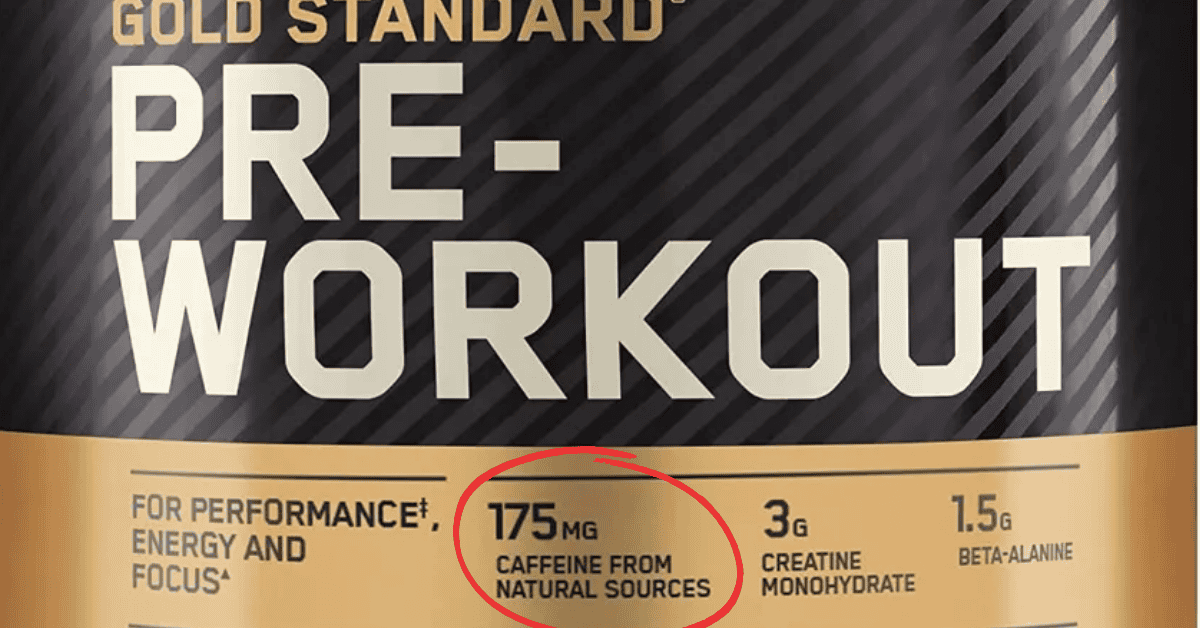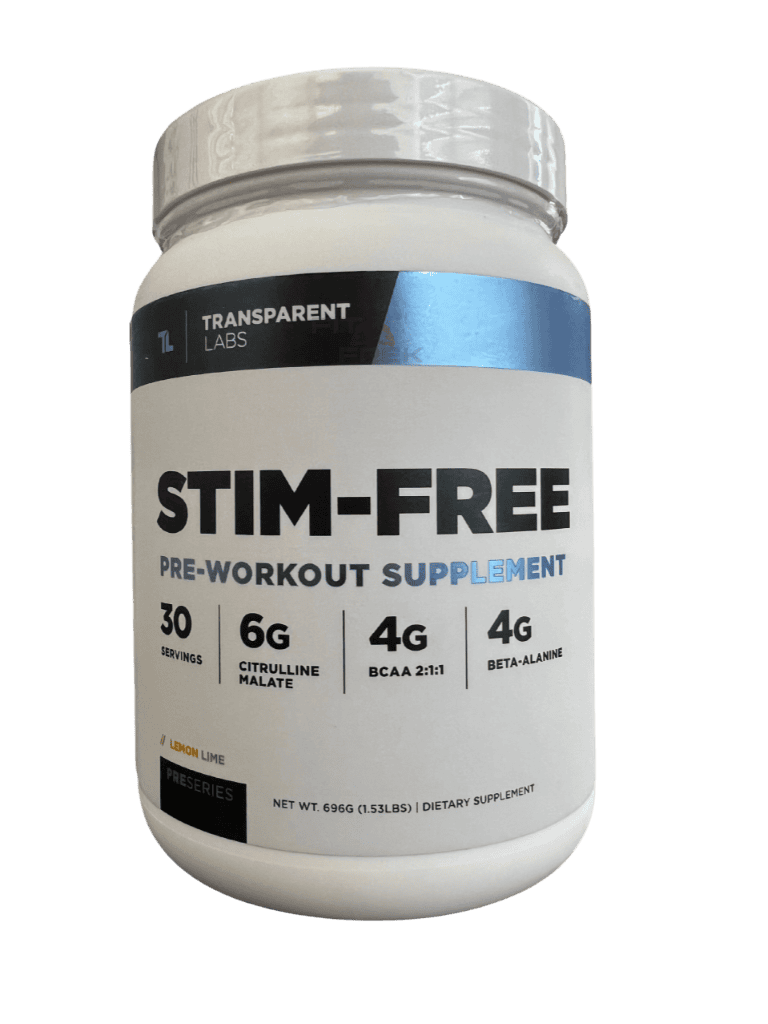
Caffeine is the powerhouse behind many pre-workout supplements, but it's not the only game in town.
Whether you're a caffeine lover or prefer to steer clear, there's a pre-workout.
Let's delve into the nitty-gritty of caffeine in pre-workouts and explore the alternatives.
Most pre-workout supplements contain caffeine as a key ingredient to boost energy and focus during exercise.
However, the amount of caffeine can vary widely between brands, and caffeine-free options are available for those sensitive to stimulants.

Caffeine is often the star player in pre-workout formulas.
It's not just about waking you up; it's about enhancing your performance.
Research shows caffeine improves endurance, reduces perceived effort, and even increases power output.
Caffeine is more than just a quick pick-me-up; it's a multifaceted compound that offers a range of benefits, especially when it comes to enhancing your workout experience.
From boosting your energy levels to sharpening your mental focus and even aiding in post-workout recovery, caffeine is a versatile ingredient that can significantly improve various aspects of your physical performance.
In the following sections, we'll detail each of these benefits, backed by scientific evidence, to give you a comprehensive understanding of why caffeine is often a key component in pre-workout supplements.
One of the most immediate and noticeable effects of caffeine is its energy surge.
This stimulant targets your central nervous system, making you more awake and alert.
Research shows caffeine can significantly improve subjective energy ratings, which is crucial for intense workout sessions.
Caffeine isn't just about physical energy; it also sharpens your mind.
Studies indicate caffeine can enhance cognitive functions like attention, reaction time, and vigilance.
This heightened focus can be particularly beneficial during workouts that require precise movements or strong mental engagement.
Caffeine has been extensively studied for its role in physical performance, and the results are promising.
It can improve various aspects of performance, including muscle strength, power, and endurance.
One study found that caffeine could improve bench press velocity, a key performance indicator in strength training.
Caffeine could be your ally if you're looking to shed some pounds.
It has thermogenic properties, meaning it can increase your metabolic rate.
While the fat-burning effects can vary from person to person, many seek an added benefit in a pre-workout supplement.
Feeling the burn is great, but too much muscle pain can hinder your workout performance.
Caffeine has analgesic (pain-killing) properties that can make your workout more comfortable.
Research proves that caffeine can reduce the perception of muscle pain during exercise, allowing you to push yourself harder and potentially achieve better results.
Fatigue is inevitable in any strenuous exercise, but caffeine can help delay its onset.
This study shows that caffeine can increase the time to exhaustion during aerobic activities, allowing for a longer and potentially more effective workout.
Post-workout recovery is crucial for muscle growth and overall fitness improvement.
Caffeine has been found to help with this as well.
Research shows that consuming caffeine post-workout can accelerate the replenishment of glycogen levels, essential for recovery.
By understanding these diverse benefits of caffeine, you can better appreciate its common inclusion in pre-workout supplements.
Caffeine has something to offer, whether you're looking to boost your energy, focus, or even recovery.
When it comes to caffeine consumption, moderation is key.
According to a comprehensive review on the safety of ingested caffeine published in Front Psychiatry, the safe dose varies among individuals.
It can be harmful for vulnerable populations like pregnant women and those with heart conditions.
The FDA suggests an upper limit of 400mg of caffeine daily for most adults.
Exceeding this limit can lead to negative effects such as jitters, insomnia, and increased heart rate.
Scholarly articles also indicate that too much caffeine can cause various physical and psychological symptoms, including poor health and potential reproductive issues (source).

Certainly, before diving into the specific ingredients commonly found in pre-workout supplements, it's important to note that these formulations can vary widely.
Some may contain caffeine for that extra energy, while others might be caffeine-free for those sensitive to stimulants.
The ingredient list often extends beyond the usual suspects like citrulline, beta-alanine, and caffeine.
Manufacturers frequently include a range of amino acids, herbal extracts, and other compounds designed to offer a comprehensive approach to boosting your workout.
So, whether you're looking for a stimulant kick or a more mellow boost, there's likely a pre-workout supplement tailored to your needs.
L-citrulline is an amino acid that plays a crucial role in the urea cycle, helping to rid the body of ammonia.
It is often included in pre-workout supplements to improve blood flow and enhance exercise performance.
This study found that a multi-ingredient pre-workout supplement containing L-citrulline malate was less effective than caffeine alone in improving bench press performance.
However, it still plays a role in various pre-workout formulas.
Agmatine is a metabolite of L-arginine and is believed to act as a neurotransmitter and neuromodulator.
It is included in pre-workout supplements for its potential to improve mental clarity and stress management, and to enhance pump during workouts.
Beta-alanine is another amino acid that is commonly found in pre-workout supplements.
It is known for its ability to buffer acid in muscles, increasing physical performance in the 60–240-second range.
This source discusses the common ingredient profiles of multi-ingredient pre-workout supplements, including beta-alanine.
Caffeine is a well-known stimulant that affects the central nervous system and can improve mental focus and energy.
It is one of the most common ingredients in pre-workout supplements.
Research found that a caffeinated pre-workout formulation improved maximal force production during an isometric squat test.
Theobromine is a compound found in cocoa and is structurally similar to caffeine.
It acts as a mild stimulant and vasodilator.
While not as potent as caffeine, it is often included in pre-workout supplements for its subtler, longer-lasting effects.
Creatine is one of the most researched and supported supplements for increasing high-intensity exercise capacity and lean body mass during training.
A study demonstrated improvements in VO2 max and body composition when creatine is combined with high-intensity interval training.
Each ingredient has its benefits and potential drawbacks, and their effectiveness can vary from person to person.
It's also worth noting that many pre-workout supplements contain a blend of these ingredients, which can have synergistic effects.
If you're sensitive to caffeine or prefer to avoid it, you'll be pleased to know that effective caffeine-free pre-workout options are available.
These formulations are designed to offer many of the same benefits as their caffeinated counterparts, without the potential jitters or sleep disturbances that some people experience with caffeine.
By choosing a caffeine-free pre-workout, you can still achieve enhanced focus, increased endurance, and improved blood flow, all without the potential downsides of caffeine.
It's all about knowing what to look for and understanding that you don't have to compromise on performance just because you're skipping the stimulant.
You can find stimulant-free pre-workouts here.

If you're an athlete or fitness enthusiast who tolerates caffeine well, a caffeinated pre-workout could be your ticket to improved performance.
If you're sensitive to caffeine or have certain medical conditions, opting for a caffeine-free pre-workout is best.
Excessive caffeine can lead to headaches, insomnia, and even cardiac events.
Always monitor your intake and consider any interactions with other supplements or medications.
For more on stimulants in pre-workouts, check out this article.
Whether you choose a caffeinated or caffeine-free option, start with a lower dosage and monitor your body's response.
Gradually increase as needed, but always stay within safe limits.
When it comes to fueling your workouts, the options are far from limited to just the standard caffeinated pre-workout supplements.
The market is teeming with alternatives that cater to various needs, preferences, and sensitivities.
Natural pre-workouts might be your go-to if you prefer to keep things organic.
These usually contain ingredients like beetroot juice, known for its nitrate content that can improve blood flow, and coconut water for hydration.
You won't find artificial sweeteners or synthetic stimulants here, making it a clean option for health-conscious people.
Believe it or not, you can still get a solid energy boost without the jitters that caffeine sometimes brings.
Caffeine-free pre-workouts often rely on amino acids like citrulline and beta-alanine to improve blood flow and reduce muscle fatigue.
If you work out in the evening or are sensitive to caffeine, this could be a game-changer for you.
For more on this, you might want to explore what is non-stimulant pre-workout.
If you're skeptical about what goes into commercial pre-workouts, why not make your own?
With a little research, you can mix and match ingredients like BCAAs, citrulline malate, and even a dash of natural sweeteners like Stevia to create a blend that works for you.
This way, you know exactly what you're putting into your body.
Sometimes, the simplest options are the most effective.
A strong black coffee or green tea cup can be a great pre-workout.
Both contain natural caffeine and antioxidants, providing a balanced energy boost.
If you compare caffeine in pre-workout vs. coffee, both have pros and cons but can be effective in their own right.w
Another avenue to explore is the world of adaptogens and herbal extracts like Ashwagandha or Rhodiola Rosea.
These natural compounds help your body adapt to stress and balance hormone levels, benefitting mental and physical performance.
By understanding the different types of pre-workouts and their ingredients, you can make an informed choice that aligns with your fitness goals and lifestyle.
Whether you're a caffeine junkie or prefer to keep things natural, there's something out there for everyone.

Is caffeine necessary for a pre-workout to be effective?
No, caffeine is not mandatory for a pre-workout to be effective. Various other ingredients like citrulline, beta-alanine, and BCAAs can provide benefits. If you're curious about what pre-workout does, read more about it here.
What are the side effects of caffeine in pre-workouts?
Some people may experience jitters, insomnia, or an increased heart rate. Knowing who shouldn't take pre-workout and consult with a healthcare provider is crucial.
Can I build a tolerance to caffeine?
Yes, regular consumption can lead to tolerance. If you're wondering how much pre-workout to take, you should cycle off caffeine periodically to reset your tolerance.
How much caffeine is too much in a pre-workout?
The safe upper limit is generally considered to be 400mg per day for most adults. However, excessive amounts can be dangerous, and it's worth considering whether pre-workouts can kill you under extreme circumstances.
Are there natural sources of caffeine that can be used as a pre-workout?
Yes, natural sources like green tea extract are often used. If you're comparing caffeine in pre-workout vs. coffee, both have their pros and cons.
How long before a workout should I take a caffeinated pre-workout?
About 30 minutes before your workout is optimal. If you're curious about how long pre-workout lasts, the effects can vary based on the ingredients.
Can I mix caffeine with other stimulants?
Mixing caffeine with other stimulants can increase the risk of negative side effects. Knowing what gives energy in a pre-workout and consulting a healthcare provider is essential.
Is it safe to use a pre-workout with caffeine for evening workouts?
Using a caffeinated pre-workout in the evening can interfere with sleep quality. If you prefer something less stimulating, you might want to explore what is non-stimulant pre-workout.
Can I take a pre-workout with caffeine if I'm pregnant or breastfeeding?
It's generally not recommended. Always consult a healthcare provider for personalized advice, especially if you fall into the category of those who shouldn't take pre-workout.
What are some caffeine-free alternatives to pre-workout supplements?
Caffeine-free pre-workouts often contain ingredients like citrulline, beta-alanine, and BCAAs. Some people also use natural energy boosters like coconut water or beetroot juice. For more on this, check out what is non-stimulant pre-workout.
Caffeine can be a powerful ally or a potential pitfall in your fitness journey.
The key is to know your body and make informed choices about your pre-workout supplements, whether they contain caffeine or not.
Useful Links
 About FitFrek
About FitFrekFitFrek operates as an independent platform, offering comprehensive workouts, programs, routines, guides, and unbiased reviews to accelerate your progress. We pride ourselves on our honesty, delivering straightforward and candid insights. FitFrek does not offer medical advice, diagnosis, or treatment services.